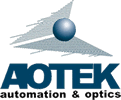An internationally relevant project which, thanks to its extreme accuracy requirements, will allow the Basque cooperative to discover how their products behave in order to perfect them
The initiative has been made possible by the cooperation and financial support provided by the Gipuzkoa Provincial Council, a body that has backed more than 120 R&D projects in the last tow years.
It has been inaugurated during a visit to the facilities of the research organisation made by the three parties
The IK4-TEKNIKER technology centre and Fagor Automation-Aotek, specialised in manufacturing automating and control systems for machinery have presented this morning, together with the Gipuzkoa Provincial Council, a new project that reinforces the joint development of cutting-edge technologies for nanometric calibration and measuring systems.
Specifically, the company and the technology centre have developed an ultra-precision linear test bench that will allow the Basque cooperative to run tests and apply state of the art technology to the behaviour of linear position encoders.
In this way, it is expected that a development of this kind will make it possible to optimise the performance of several industrial machines such as high-output lathes and machining centres.
The presentation has taken place within the framework of a visit to the facilities that the technology centres owns in Eibar with the presence of the Regional Deputy for Economic Promotion, Rural Environment and Territorial Balance, Ainhoa Aizpuru, as well as of the director general of Fagor Automation-Aotek, José Pérez Berdud and the assistant general manager of IK4-TEKNIKER, Luis G. Uriarte.
At the end of the visit, Deputy Ainhoa Aizpuru stated that the project presented does not only represent “a highly significant technological breakthrough” that will allow Fagor Automotion’s products “to gain competitiveness and excellence in increasingly demanding markets”, but also offers “a clear example” of the collaborative work carried out by this company and the technology centre.
In the words of Aizpuru, “the generation and transfer of advanced knowledge to our companies is a key element as regards maintaining the industry’s competitiveness. The Provincial Council has set itself the target of positioning Gipuzkoa as a leading region in terms of R&D at a European level and it is along these lines that we should support and intensify the degree of cooperation between our companies and our technology centres”.
As detailed, and within the framework of the so-called Economic Reactivation Plan, the Provincial Council has supported 124 R&D projects in the last two years –55 in 2016 and 69 in this fiscal year of 2017–, by allocating 8,841,620 euros in 2016 and 2017 through the support programme for the Science, Technology and Innovation network. A total of 66 centres, university departments and entities devoted to R&D have been involved in these projects, mainly focused on the areas of advanced manufacturing, energy and biosciences /health.
An ultra-accurate and internationally relevant system
During the event, the technology centre and Fagor Automation-Aotek have presented the results achieved to officials from the Provincial Council. The project has given rise to a very innovative test bench that has a high degree of international relevance due to its ultra-precision requirements and which it has been possible to develop thanks to the financial support provided by the Gipuzkoa Provincial Council.
IK4 TEKNIKER, an expert in precision engineering and metrology, has designed and manufactured this test bench to calibrate linear catchment systems under different misalignment conditions.
The ultra-precision test bench has been designed to operate with the entire range of Fagor’s linear catchment products. The test bench offers a maximum calibration length of 3200 mm. Its most salient feature consists in interferometric measuring of off-load shifting, free from Abbe errors, which means that the test bench can achieve an unprecedented measurement accuracy below 10 nm/m
The expertise and know-how of the Basque cooperative have transformed it into the first and only Spanish company that is able produce these position encoders in their entirety as Fagor Automation has proprietary know-how in all four fields of production, namely mechanics, optics, electronics and software.
This project will allow the cooperative to investigate the operational and design parameters of position encoders to develop new and more accurate models.
The project is another example of the current collaboration between the Basque research centre, the Gipuzkoa Provincial Council and Fagor Automation-Aotek and whose goal is to develop elements that will improve the accuracy of the materials they manufacture.

